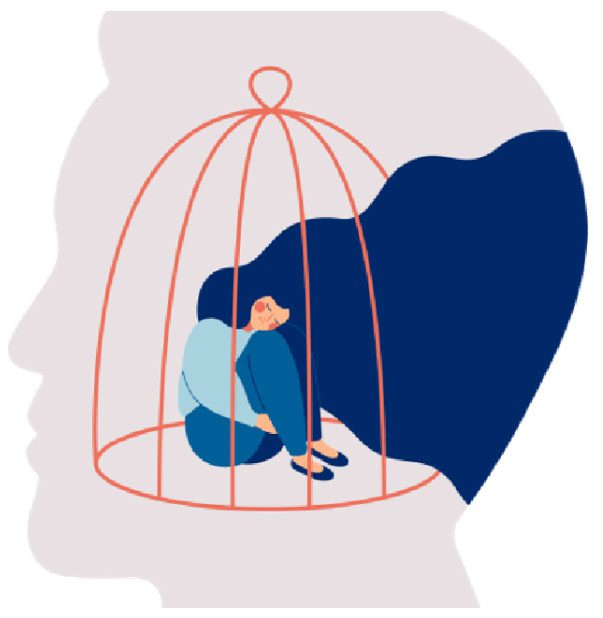The available words have never been enough to name and describe the complex emotions of human beings, which is why psychologists always have to “invent” new concepts.
Unique Psychological Emotions Experienced by Humans
Language does not always fully and accurately express human emotions. There are still many emotional states for which we lack descriptive words. Surely, each of us has experienced some of the following ten states but never knew how to explain them.
1. Dysphoria

This is a general state of sadness that includes feelings of restlessness, lack of energy…
This term describes the feeling of sadness associated with psychological disorders. Dysphoria is a general state of sadness that includes feelings of restlessness, lack of energy, anxiety, and vague agitation. It is the opposite of euphoria and differs from typical sadness as it also includes feelings of irritability and anger. You may have experienced this dysphoria when facing a distressing, utterly boring, or depressive situation.
2. Enthrallment
Psychology professor W. Gerrod Parrott coined this term. Unlike ordinary joy, enthrallment is a state of intense delight. It is not the same as love or desire. You might experience it when witnessing a breathtaking spectacle—such as a concert, a movie, or a rocket launch—as long as it captures your full attention and elevates your mood to an overwhelming height.
3. Normopathy

Many people experience this state at different times in their lives.
Psychiatric theorist Christopher Bollas used this term to describe individuals who focus on integrating and adhering to social norms to the extent that it becomes a kind of euphoria for them. By merely doing what society expects, they worship conformity to the extreme and lack personal character.
Many people go through this state at various times in their lives, especially when trying to fit into a new social environment or attempting to hide behaviors they believe others will condemn.
4. Abjection
French philosopher Julia Kristeva wrote an entire book on the meaning of the abjection experience, which can be understood as feeling crisis, disgust, or shock. Every human experiences this emotion from birth when we first realize that our body is separate from our mother’s body. This sense of separation causes extreme terror.
This feeling is reactivated when we go through life events. Typically, abjection is what you feel when witnessing or experiencing something so horrific that it drives you mad, such as seeing a corpse.
5. Sublimation
Sigmund Freud, the founder of psychoanalysis, believed that human emotions are like a steam engine and that sexual desire is the steam. If you block the steam from escaping through a valve, pressure builds up and forces steam out of another valve. Sublimation is the process of redirecting your sexual desire from physical relationships to doing something that sounds meaningful and much more useful, such as writing an essay, repairing a lawn mower, or developing software.
If you have ever channeled your frustration into building something or felt an intense, strange joy from creating a piece of art, then you are experiencing sublimation.
6. Repetition Compulsion

This state means the desire to repeat actions you have done before, even knowing they are ineffective.
This is also a psychological state identified by Freud, meaning the desire to repeat actions you have done before, even knowing they are ineffective, potentially dangerous, or harmful. A simple example could be always ordering the same “favorite” dish at a familiar restaurant or taking the same route home every day. You continue to do so even when you know there are other delicious dishes and easier ways to get home. You might also insist on loving someone even when you know it will not end well.
7. Aporia
Have you ever felt a maddening emptiness upon realizing that something you always believed is not actually true? And then things become even stranger when you realize that what you believe could be true and could not be—and you will never really know? That is aporia.
This term comes from ancient Greek but is also favored by theorists like Jacques Derrida and Gayatri Spivak. The reason modern theorists love aporia is that it helps describe the feelings people have in an information-overloaded world, where you are often bombarded with conflicting messages.
8. Compersion

A person experiencing compersion can feel comfortable seeing their partner happy with someone else.
The term compersion has become quite popular today, especially online, to refer to open relationships, describing the opposite feeling of jealousy when your partner dates someone else. While a monogamous person may feel jealous seeing their partner kiss someone else, a person experiencing compersion may feel comfortable, even joyful, seeing their partner happy with someone else.
9. Emotional Groups
Some psychologists argue that there are feelings we can only have as members of a group. Often, you will only notice them when they conflict with your personal feelings. For example, you feel proud when your national football team wins an international tournament. Although you did not compete and did not contribute to this achievement, nor are you personally responsible for what has happened, you still share in the group’s feeling of pride.



















































